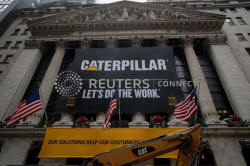How Deere, Caterpillar kept plants running during the
coronavirus outbreak
 Send a link to a friend
Send a link to a friend
 [May 08, 2020] By
Rajesh Kumar Singh [May 08, 2020] By
Rajesh Kumar Singh
CHICAGO (Reuters) - While Detroit
automakers' unionized auto factories have been idled by the coronavirus
pandemic, farm and construction equipment makers Deere <DE.N> and
Caterpillar <CAT.N> have won the support of the United Auto Workers and
other unions to run their facilities during the pandemic.
As U.S. states begin to lift lockdown orders and companies gear up to
restart production, the policies put in place by the two heavy equipment
makers offer a template for returning workers to idled factories in
other sectors.
Giving employees sick time without penalty, temperature screenings,
staggered shifts and hiring a hygiene-auditing firm are some of the
measures the two companies have taken to reassure employees to stay on
production lines when many union and non-union workers balk at reporting
for jobs that could expose them to the novel coronavirus that causes
COVID-19.
Detroit's auto companies had to negotiate long and hard with the United
Auto Workers, which represents their hourly workers, over how and when
to restart U.S. production. The UAW blocked the automakers' plans to
restart their factories on May 4.

The union this week signaled its members are ready to go back to work at
General Motors Co <GM.N>, Ford Motor Co <F.N> and Fiat Chrysler
Automobiles NV's U.S. factories on May 18.
By contrast, the UAW let Deere resume production at two of its
facilities within days of employees testing positive for the virus.
Union officials attribute that decision to a safety policy they
negotiated with the company that mandates a strict implementation of
guidelines prescribed by the nation's health protection agency and the
World Health Organization.
But it was a provision for expanded benefits that sealed the deal, UAW
officials say.
"One of our priorities on the health and safety issue is to make sure
that our members can self-report without any kind of penalty," said
Brian Rothenberg, the UAW's public relations director. The union is
negotiating with all its employers for similar benefits in order to
reduce the risk of infection in the workplace.
Deere declined to comment officially, citing the quiet period ahead of
its earnings report later this month.
EXPANDED BENEFITS
Under its agreement with the UAW, Deere is providing paid sick leave to
cover the recommended 14 days of self-quarantine, even to workers who
think they have been exposed to the virus but are not certain and have
not been tested.
"The last thing we wanted was for individuals to feel compelled to come
to work to get paid," a Deere official said.
The Moline, Illinois-based company altered shift schedules to ensure
employees from one shift exit before the next shift reports to work. It
hired an industrial-hygiene company to audit the sanitization work at
some of its larger units.
[to top of second column] |

A banner for Caterpillar Inc. hangs on the facade of at the New York
Stock Exchange (NYSE) in New York, U.S., December 17, 2019.
REUTERS/Brendan McDermid

Additionally, the farm equipment maker enhanced pay provisions to cover the
challenges workers face due to day care and school closings. It also waived
copays, coinsurance and deductibles for its employees for coronavirus testing.
At Caterpillar, the UAW and the United Steelworkers have negotiated a similar
paid sick leave policy for their members.
The heavy equipment maker is offering workers paid sick leave up to 2 weeks if
they have been instructed to self-quarantine. The benefit also can be used for
taking care of immediate family members.
Production employees are allowed time off up to 10 weeks at 2/3 of their salary
for child care.
Caterpillar spokeswoman Kate Kenny said the benefits are available to all
employees who are unable to work from home, not just union members.
Workers are required to go for temperature checks before entering some
facilities. To ensure social distancing, lunch hours have been extended at some
locations and visitor access has been limited.
WORKING, BUT NOT BUSINESS AS USUAL
It has not been smooth sailing for the two equipment manufacturers. Factories
are hobbled by supply shortages, weakened demand and increased absenteeism among
workers.
Caterpillar's retail sales dropped by 20% in North America in March. In response
to the virus-induced business disruption, the company is temporarily shutting
down facilities and imposed indefinite or temporary layoffs.
Chief Financial Officer Andrew Bonfield said Caterpillar is managing production
by segment and adjusting its workforce by facility.
The situation at Deere is also uncertain. The company will temporarily suspend
production at its Davenport and Dubuque facilities in Iowa on May 11 for two
weeks due to supply chain disruptions.

Depressed demand for construction and forestry equipment in the wake of the
pandemic has led the company to lay off 159 employees indefinitely at the
Dubuque facility.
"You prepare for crises, but crises would be at one factory," the Deere official
said. "This is a crisis that has upended every unit."
(Reporting by Rajesh Kumar Singh; Editing by Joseph White and Dan Grebler)
[© 2020 Thomson Reuters. All rights
reserved.] Copyright 2020 Reuters. All rights reserved. This material may not be published,
broadcast, rewritten or redistributed.
Thompson Reuters is solely responsible for this content. |